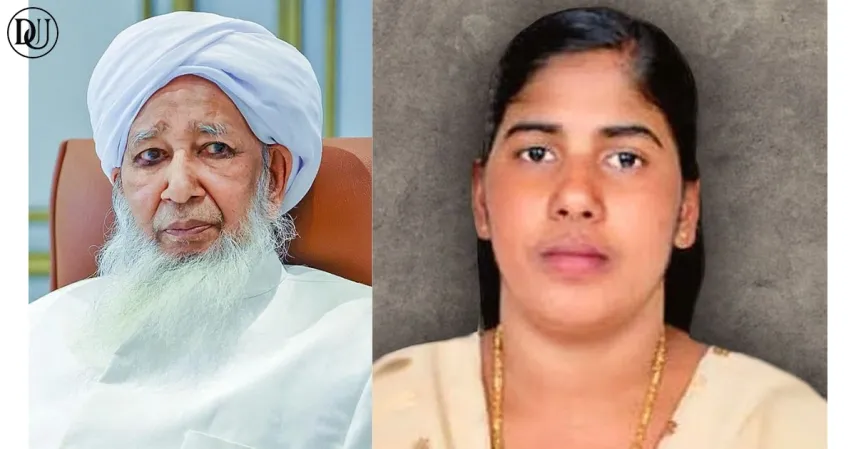Eleven crore rupees—just imagine that kind of money being offered to save someone from execution. It's a staggering sum, right? And what’s even more wild is who’s behind it: Kanthapuram AP Aboobacker Musliyar, a prominent religious leader from Kerala. You hear about these big, complex international legal battles, but when a spiritual figure steps in with that kind of financial commitment and negotiation power, it just changes the whole dynamic, doesn’t it?
I'd been following the Nimisha Priya case, like, for a while, you know? It's been in the news off and on, this Indian nurse sentenced to death in Yemen for killing a local man. Super tragic, super complicated. But then this news dropped about Kanthapuram AP leading efforts to extend her execution, even offering that massive sum for what they call 'blood money' or 'diya' in Yemeni law. It makes you pause and think about the reach of humanitarian efforts, especially when they're rooted in faith and community.
Who is Kanthapuram AP? 🤔
Honestly, before this specific news, I knew his name, but maybe not the full extent of his influence. Kanthapuram AP isn’t just some local cleric; he's often referred to as the Grand Mufti of India. That’s a huge title, basically the highest authority for Sunni Muslims in the country. He heads up the All India Sunni Jamiyyathul Ulama, a major organization, and he’s also the president of the Kerala Muslim Jamath. He’s got this vast network of educational institutions under him, from schools to colleges, and he’s known for promoting moderate Islamic thought. It’s pretty clear he’s a massive figure, a real heavyweight in the religious and social landscape of India, particularly in Kerala.
The Nimisha Priya Connection ⚖️
So, the Nimisha Priya case is this incredibly complex situation involving an Indian nurse who was sentenced to death in Yemen for the murder of Talal Abdo Mahdi. Her story is pretty harrowing, you know, allegations of being held captive, physical abuse, forced conversion, and then this tragic outcome where she injected him with sedatives, leading to his death. Her family in Kerala has been desperately trying to save her, appealing to the Indian government and really anyone who could help. It’s been a long, drawn-out legal battle, made even tougher by the political instability in Yemen.
A Diplomatic Mission 🤝
This is where Kanthapuram AP steps in. It wasn't just a casual offer from afar. He actually put together a delegation. Can you imagine? A top religious leader, like, taking the initiative to travel to a war-torn country, engaging in these incredibly sensitive negotiations with the victim’s family. It’s not just about money, you know; it’s about diplomacy, about convincing a grieving family to forgive, to accept 'diya' instead of demanding execution. It really highlights his commitment to humanitarian causes, beyond just his religious duties. He’s basically trying to broker peace in a situation that feels almost impossible.
The Rs 11 Crore Offer 💰
The figure of 11 crore rupees—that’s a staggering amount, something like $1.3 million USD. The source implies this was offered to secure a waiver from the victim's family, essentially as 'blood money' or 'diya,' which is an acceptable form of compensation under Islamic law to pardon a capital crime. It’s not just a random donation; it's a specific legal mechanism in that part of the world. The goal was to get the family to sign an affidavit, basically forgiving Nimisha, which would then allow her execution to be suspended or even commuted. It’s a desperate measure, but honestly, what else could you do in that situation? They needed to buy time, and this was the way to do it. The report said he offered the money through the 'Action Council for Nimisha Priya' which he heads, a collective effort to save her.
Beyond the Nimisha Priya Case 🌍
You know, his involvement in this case, while highly publicized, isn’t an isolated incident. Kanthapuram AP has a long history of social work and community building. He's been instrumental in setting up numerous orphanages, educational institutions, and even hospitals. He’s always advocated for communal harmony, and he’s a strong voice against extremism, which is really important, especially in the current global climate. His reach extends beyond India, connecting with Muslim communities internationally. So, in a way, this Nimisha Priya intervention is just another facet of his broader humanitarian and leadership role.
What Happens Next? ⏳
Well, that’s the million-dollar (or rather, 11-crore rupee) question, isn't it? The reports suggest the negotiations are incredibly delicate. Even with the money offered, the victim's family holds the ultimate power of pardon. Yemeni law is pretty clear on this: the family's forgiveness is paramount for the 'diya' to be accepted and the execution averted. The talks are ongoing, but it's not a guaranteed outcome. There are so many moving parts—the political situation in Yemen, the family’s emotional state, the legal process. It’s like, you can offer all the money in the world, but emotions and cultural norms play a massive role too. I mean, it’s a high-stakes waiting game, plain and simple.
It really makes you think about the power of individuals, even in the face of daunting international legal systems. A person like Kanthapuram AP, leveraging his influence and resources to make such a profound difference – it’s genuinely remarkable. You just hope it works out for Nimisha Priya, and that his efforts pay off. It’s a story that just keeps unfolding, and you can’t help but be invested in the human element of it all.










